Blog Archives
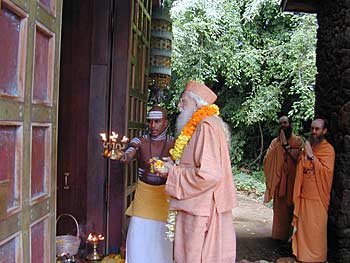
Gurudeva arriving home from the last Innersearch… When ever he traveled with the monks he would always say as soon as he left, even for a long mission “Now we think about returning home. Go out, do your mission, look not left or right, but stay focused, keep the feeling that you are on your way home.” He would call the Aadheenam frequently from wherever he was to stay in touch saying “We can feel you all… your strength and sadhana, that is what supports us out here during our travels.”
Our Beloved and Revered Satguru Sivaya Subramuniyaswami
Attained Maha Samadhi on November 12th, 2001
Click to read for Details.
Click here to read
Gurudeva’s statement on September 11th
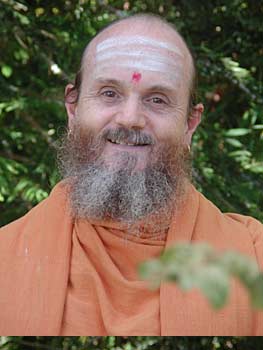
Satguru Bodhinatha Veylanswami, will be traveling later this year.
Cybertalk: The Realization of Parasiva is like waking up from a dream during
which you were dreaming that you weren’t the Self. But you were all along.
Claim it. Tamil word for home, veedu, also means liberation. It’s like
coming home. This is monism. Lesson 315 from Living with Siva talks about
worshiping God Siva as the God of love. This is theism. We need to become
beings of love.
Cybertalk Ends”
For more information about listening to Gurudeva’s talks online and to hear them in other formats, click here.
And click here for an Index to All Past CyberTalks.
Study Gurudeva’s teachings
every day. Visit the Master Course site!
Bodhinatha will be happy to hold “Prasnottara Satsang” — “Questions and Answers” over the telephone with any Hindu religious societies, Hindu youth groups, Radio talk show hosts etc. All you need is a phone with a speaker and an enthusiastic audience. Arrangements may be made in advance by sending email to Sadhaka Mahadevan
If you are experiencing any problems listening to the audio, please to go our Audio FAQ page for sound geeks and follow the directions there.
 |
|
|
 |
||
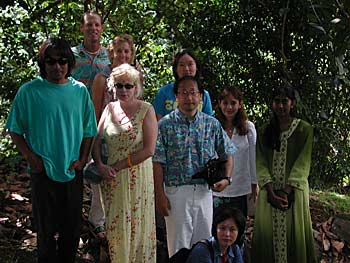
A group of seekers from Oahu. On the right is Miss Subramaniam who is from Jaffna, Sri Lanka and currently going to University in Honolulu. She was very proud to bring her friends to the citadel of Saivism.
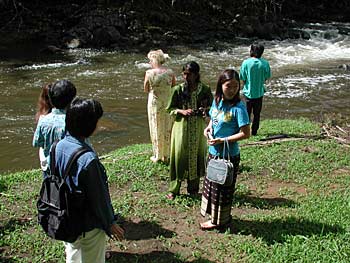
A walk along the Wailua River where devotees perform “ganga sadhana”.
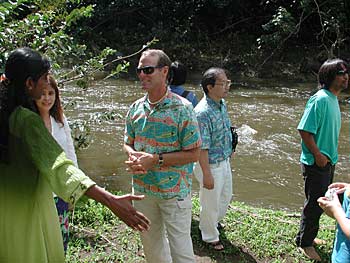
They seem to be enjoying their experience of “heaven on earth.”
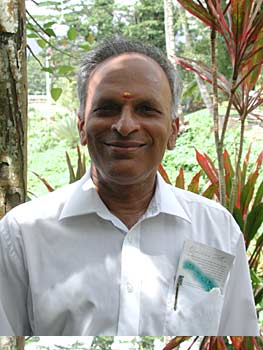
Dr K. Parasivam, on pilgrimage from Adelaide, Australia. He was originally from Sri Lanka, then his family went to Malaysia. He says they have a wonderful temple in Adelaide with a Sri Lankan priest, but the whole community comes. On one side of the temple are marble statures of Lakshmi Narayan and Durga… highly decorated and worshipped North Indian style, and on the other wall are granite murthis which are worshipped with abhishekam in South Indian style.
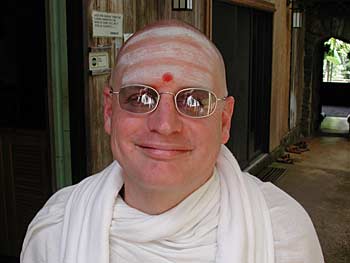
Sadhaka Haranandinatha is one of our most senior Sadhakas and also our book sales manager. Sadhaka is an “adept” at getting printed matter from any place in the world to any other place in the world!
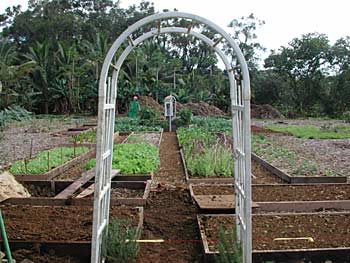
Our Siddhidata Kulam is doing a “complete make over” of our vegetable garden. After years of using a tractor, Gurudeva explained that the devas were not happy with the tractor (and we were not happy with all the weeds!) So Sannyasin Yoginathaswami transformed the garden into a mulch garden…. no more machines tilling the soil. The worms do all the work.
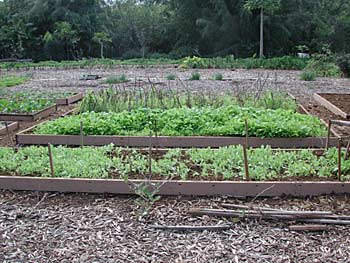
Because of the nature of our clay soil and high rainfall, the garden tends to be a little be over wet… so the Siddhidata Kulam is “double-digging” by hand, down two feet and making raised beds. The system is proving to be incredibly successful and areas of the the garden that were producing poorly before are now full of fresh vegetables.

This appears to be a soft kale or collard.
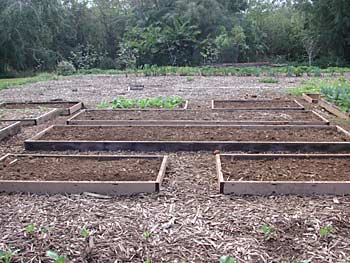
These are recent beds that have been created, ready for planting.

IN the center of the garden is a small shrine to Lord Ganesha surrounded by flowers that are left unpicked, for the devas.

Cabbage plants flourishing.

The inflourescence of a bromeliad… quite spectacularly unusual!
 The Remarkable Vision |
Iraivan Temple Progress Update |
Join this historic undertaking. Please contribute generously. Sponsor a stone today! |
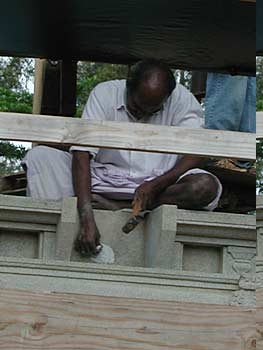
Work on the temple is proceeding smoothly. The team is almost finish with course eight and now loading sand into the retaining protecting wall and getting ready for course nine.

|
Study Gurudeva’s teachings.
|
transcription begins
Date: March_04_2002
Title: Austerity – Part 2
Category: Change and Transformation
Duration: 9 min., 7 seconds
Date Given: March 01, 2002
Given by: Bodhinatha
“Sacrifice,” Gurudeva says, “is giving up to a greater power a cherished possession, be it money, time, intelligence or physical object to manifest a greater good.”
The story that Gurudeva uses in ‘Living with Siva’ to demonstrate sacrifice, is the famous story about Yogaswami and the pit. Yogaswami had a big meal cooked, for thousands of people there. When the time came to eat, which was noon, he said, “Well, lets keep singing.” So they kept singing. Then, he had them dig a pit and sing some more. Finally, in the evening around 6 p.m., they still hadn’t eaten. He had them put the food into the pit in a nicely organized way, all on banana leaves, a big heap of rice in the middle, curries on the side. It was laid out just like a huge meal. Finally, he had them cover it up with dirt. They didn’t get to eat, they spent all day worshipping. They didn’t get to eat and he said, “”Mother Earth always feeds us. Today, we are feeding Mother Earth in return.”
That was sacrifice. They denied themselves a meal, involuntarily in that case. Involuntary sacrifice. But it shows the spirit of self-denial. You give up something that you would normally have, in some religious way or for some selfless purpose. Some examples of sacrifice – fasting for a day and giving the money saved to a Hindu project. Normally we would eat but we choose that day to fast, even though we don’t have to. It is not pradosha, which doesn’t count if you are normally observing pradosha. It is doing something extra, something you don’t have to do. You fast for a day when you don’t have to fast and do something with the money you saved. That would be an example of sacrifice.
Another example, instead of going on a fancy vacation, go on a budget vacation. Take the money saved and do something noble with it. You are giving up.
A couple of family examples of sacrifice. The kids get together and tell mom she can’t cook tonight because they are going to cook dinner. They give up their free time. They don’t have to cook dinner, but they give up their free time in this case. They are sacrificing free time to help their mother. The kids take care of the grandparents and let the parents have a day off. Sacrifice – doing something you don’t have to do for a good cause.
All of those have in common the idea – we are disciplining our instinctive mind, becoming less selfish, giving ourselves greater control of our instinctive mind and benefiting something or someone else. All the benefit is for someone else, is someone else’s. So that is the idea of sacrifice.
The fourth aspect of austerity is tapas.
A number of the monks have been asking me about tapas so it makes it a hot topic, so to speak. Tapas means ‘to burn’.
Yogaswami was once asked why he scolded his devotees so intensely. Remember his answer? He said, “Isn’t a fire needed to burn rubbish?” Isn’t a fire needed to burn rubbish? Of course, the fire in this case was his fiery words and the rubbish was the impurity in the mind of the devotee he was scolding. He was trying to help the devotee become more pure.
That is the spirit of tapas. It is purification through burning up the impurities. Gurudeva gives a beautiful definition, very poetic, a little bit long, but it is so special I thought I would read it. “Tapas is even more austere,” meaning more austere than penance. “It may come early in a life time or later in life, unbidden or provoked by Raja yoga practices. It is the fire that straightens the twisted light and mind of an individual, bringing him into pure being, giving a new start in life, awakening a higher consciousness and a cosmic relationship with God and the Gods, friends, relatives and casual acquaintances.”
The phrase that stood out there to me was, “giving a new start in life”. One of the qualities that happens in life is you start out unburdened, jumping around, having fun, playing. We can become quite burdened with what we experience in life, difficulties we face, what we have done wrong, regrets, remorse. We are not jumping around anymore in a happy joyous way. We have become burdened by life. For most individuals, when they get in that state of mind, it never goes away. It either stays the same or gets progressively worse. But this is saying we can throw it off, start a new life. You can burn it up, you can resolve it and start fresh. That is part of the idea of tapas.
Gurudeva continues, “When tapas begins, it will burn off the accumulated dross from the wrong doings of many past lives
and eventually lift the soul into higher consciousness. This is why we call higher consciousness, Siva consciousness.” Not only does it work on this life, it goes into the past as well. “Tapas is a mind in turmoil, insane unto its very self.” Fortunately, it doesn’t last forever. “The psychic surgery is being performed by the Gods themselves.” That is important, that we are not just sitting there by our self suffering. We are invoking the blessings of the Deities and it is coming in the form of a fiery sense that is burning up these problems. “When the operation is over, the patient has been cut loose of the dross of all past lives.” Then it gets very poetic here. “Tapas is a landslide of mud, a psychic earthquake coming upon the head and consuming the body of its victim, smothering him in the dross of his misdeeds, beneath which he is unable to breathe, see, speak or hear. However, he awakens from this hideous dream resting on a mat in a garden hut, smelling sweet jasmine, seeing pictures of Gods and devas adorning the mud walls and hearing the sound of a flute coming from a distant source.”
Different kind of poetry from Gurudeva. It gives you an important sense that it ends in a very nice way. You end up in a very purified state, very blissful state when the process is over.
transcription ends
|
MORE UPLIFTING THINGS |
Innersearch 2002 in Hawaii!
Our next Innersearch Travel-Study program will be held right here on the island of Kauai in the summer of 2002. It’s the first such program on the Garden Island since 1974! From July 17 to July 22 we will enjoy daily classes with the swamis, join in the annual Guru Purnima festival, be inspired by local culture, explore the lush tropical island in exciting and non-touristy ways, and more. Be prepared for a wonderful spiritual experience in paradise with meditations, seminars and sacred ceremonies at the Siva temple of Kauai’s Hindu Monastery. Many have applied already, and there is a limit of 50 participants, so we recommend everyone apply as soon as possible. Interested? Please request an application from pilgrim@searchbeyond.com |
|

|
Check our children and youth section for new items for the young and young at heart! | |
|
1. SIGN OUR GUESTBOOK and receive a FREE GIFT |
||
| 2. Newest Book: LIVING WITH SIVA | ||
|
3. Visiting KAUAI’S HINDU MONASTERY |
||
|
4. Contribute to THANK YOU, GURUDEVA FUND |
||
From Our Gurus' Teachings
Archives are now available through 2001. Light colored days have no posts. 1998-2001 coming later.
